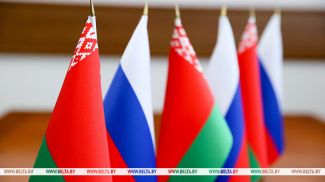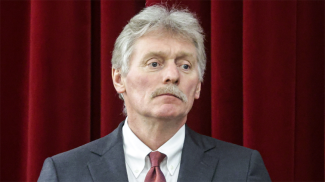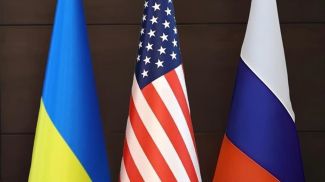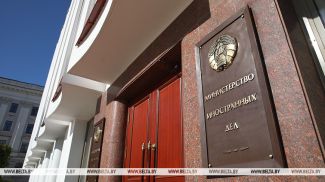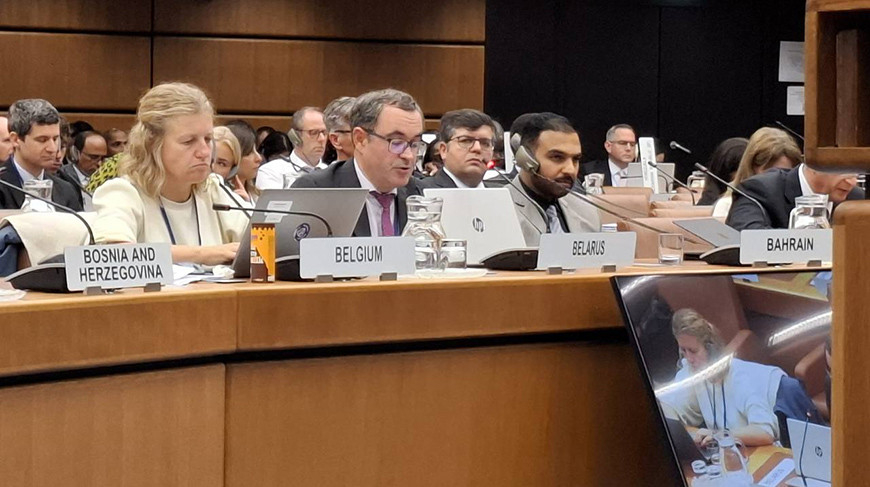
Photo courtesy of the Ministry of Foreign Affairs
MINSK, 9 October (BelTA) – Common challenges in the sphere of migration should be addressed through dialogue and cooperation instead of construction of barrier structures. Advisor of the Embassy of Belarus in Austria Vadim Pakhomchik made the statement during a conference of the states parties to the UN Convention Against Transnational Organized Crime, BelTA has learned.
“As a transit country Belarus is guided by the logic of good neighborliness, which assumes that common challenges should be addressed jointly through dialogue and cooperation rather than by erecting barriers at the common border, which are pointless and do not solve any problems,” Vadim Pakhomchik emphasized.
In his speech, the diplomat first noted that due to its location Belarus represents a transit corridor, through which illegal migrants travel to the west from Asia, Africa, and the Middle East. Belarus’ legislation provides for administrative and criminal liability for violations in the field of migration policy. In accordance with the Criminal Code the organization of illegal migration is a criminal offense: organizing, directing, or facilitating the illegal entry into Belarus, stay in Belarus, transit through Belarus, or departure from Belarus of foreign citizens or stateless persons.
“Criminal liability has also been established for illegally crossing the country’s state border. The legislation guarantees access to the relevant procedures for foreigners applying for refugee status, additional protection, or asylum in Belarus. Any foreigner is given a practical opportunity to declare their intention to seek protection both directly when crossing the state border of Belarus and in its territory,” Vadim Pakhomchik pointed out.
He stressed that despite the imposed sanctions, including restrictions on movement across land and air borders with European countries, Belarus actively fights illegal migration. The relevant authorities of Belarus constantly implement operational and preventive measures aimed at identifying and eliminating channels of illegal migration. Particular attention is paid to passenger traffic through Minsk National Airport from countries with a complicated economic and political situation as well as countries with increased migration risks.
“All detained illegal immigrants are subjected to administrative liability and are expelled from the country with simultaneous inclusion in the list of persons, whose entry is prohibited or undesirable. 2024 saw about 5,500 foreigners expelled from Belarus. In total, more than 7,500 people are included in the list. This trend continued in H1 2025: more than 2,100 foreigners were expelled and 2,800 people were included in the list,” the Belarusian diplomat cited several figures.
In addition, twice a year joint operations codenamed “Illegal” are organized within the framework of the Collective Security Treaty Organization. As a result, in 2024 about 4,000 foreigners faced administrative charges, over 590 were kicked out of the country, 249 were denied entry, and 43 groups of illegal migrants totaling 325 people were detected.
Since 2021 to H1 2025 the border service initiated 132 criminal cases against 298 individuals for organizing illegal migration.
Work is also underway in Belarus to improve regulatory legal acts in the field of migration. For example, amendments have been made to Belarusian legislation concerning the detention of illegal migrants in temporary detention centers for foreigners, the functioning of such centers, and medical care for detained foreigners. A migration policy concept for 2024-2028 has been approved, one of which objectives is to combat illegal migration and further develop mechanisms and means for the prevention, detection, and suppression of violations of migration legislation.
Apart from that, amendments to the legislation came into force in 2024, requiring that citizens notify police when providing accommodation to foreigners temporarily staying in Belarus for a period of one day or more.




